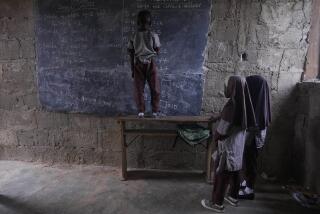Nigeria Austerity Program Causes Deep Political Discontent : Africa: The results could be significant for the rest of the continent. Meanwhile, ‘SAP’ jokes go on and on.
- Share via
BENIN CITY, Nigeria — The walls of some government buildings were still blackened from the fires set by demonstrators, and troops still trained their carbines toward the sidewalk from their redoubt behind the gates of the government radio station, when the Oba of Benin decided what was necessary to restore tranquility to this regional center: a citywide three-day fast.
“We of the Benin kingdom believe in the efficiency of personal sacrifice” to turn young people away “from their evil ways, especially violent demonstration,” and to help us all succeed in the fight against hunger (and) public disturbances,” he proclaimed.
Not nearly as many city dwellers bothered to participate in the weekend-long penance in July as had joined in a week of anti-government riots in May, when the city’s unrest spread throughout the south of Nigeria. Two people died in Benin City, and dozens in larger urban centers like Lagos.
But if the authority of Nigeria’s traditional leaders like the Oba is not what it was, his proposal did give a taste of the perplexity with which Nigerians are trying to cope with what has become sub-Saharan Africa’s stiffest program of economic austerity.
For three years now Nigerians have labored under the strictures of what they call SAP, for “Structural Adjustment Program.” As a government policy, SAP has focused on devaluing the official currency, the naira, and limiting official corruption.
But as the target of public discontent over a standard of living that has crashed since the oil boom of the 1970s, SAP means much more to the common man: It signifies everything that is painful about present-day Nigeria’s economic condition.
Newspaper columnists joking about “these SAPpy times” and editorialists warning about the country’s being “SAPped out” never have to explain what they mean. When a Lagos workingman has to leave his home at 3 a.m. to trek to work by 9 because bus service has collapsed; when families talk about living on the “0-0-1” plan--making dinner their only meal of the day; when university students live 40 to a room built to accommodate three, they blame SAP.
SAP today is biting hardest and causing the most political discontent just at the moment when it is closest to real success, according to many economists and international bankers in the country. To them, Nigeria is in a race to see whether SAP can restore its economy before wrecking its political consensus.
Many of these same bankers feel the country’s efforts to be a good international debtor are being hampered by the outside world. Nigeria, they argue, needs fiscal concessions in order to see the effort through.
Interest and principal payments on its $33 billion in foreign debt will peak over the next two years at about 80% of its income from exports. The burden will accelerate the decline in living standard just as the military government here prepares to hand power over to democratic civilian leadership in 1992.
“The great risk is that the world will be stubborn on rescheduling Nigeria’s debt,” says Tariq Husein, the World Bank’s resident representative in Lagos. “The timing is important because one must keep the morale of the country up.”
The course of Nigeria’s SAP is important for what it might say about whether Africa can emerge from its intractable slump. For more than a year, contentious discussion has raged between officials of the World Bank and those of some United Nations agencies over whether the customary World Bank and International Monetary Fund prescription is the wisest or even most effective way to make Africa function better economically.
That prescription, which involves devaluing local currencies, laying people off government payrolls, forcing up farm prices at the expense of city dwellers and developing export industries, is the essence of SAP. It is designed to make Third World economies resemble those of the developed world by making currencies reflect the real relative value of domestic and imported goods.
But it opposes a program promoted by the U.N.’s Economic Commission for Africa, which argues that the World Bank system further impoverishes poor Africans and is largely designed to make African economies the cat’s-paws of the industrial world. Instead, the ECA prefers to develop what is known as the “informal sector,” consisting of small shops and landholdings aimed at serving each country’s internal needs, rather than the export market.
The debate is inconclusive. Some Bank/IMF model clients--Senegal is one--have undergone SAP-style austerity programs for as long as 10 years without making appreciable economic progress. Others, like Ghana, are showing improvement after less time.
For all that, any lessons drawn from Nigeria’s SAP must be tempered by concessions to the unique aspects of the vast country’s economy. Chief among these is its oil.
Nigeria’s estimated 20 billion barrels of petroleum reserves are its fortune and its bane. At the peak of the oil boom in the late 1970s the country’s annual exports reached $26 billion and its per capita gross national product topped all of sub-Saharan Africa at $1,000. By 1987, as oil prices slumped, export income had dropped to $7.7 billion and per capita GNP to $370.
Like sailors on leave, the Nigerians overspent wildly during the boom. It’s a habit they have never quite broken.
At the peak of the oil years no government expenditure was considered too extravagant.
“SAP isn’t the problem; the problem is the fall in oil prices and the need to live within your means,” says an economist at a Western embassy in Lagos.
But SAP is how the Nigerians define the problem. A visitor cannot avoid the impression that Nigerians are more acutely sensitive to the differences between the way they live now and the way they lived before than most other people in Africa.
No conversation with a Nigerian continues for long before a recital of price increases of staples, necessities and luxuries, virtually month by month and down to the last naira. In few other lands do people find such colorful ways of expressing their economic collapse.
“We have a saying that when all else fails, it’s gari and so to bed,” says Elizabeth Adeyo, a broadcasting assistant in Lagos, referring to the cassava starch that is a staple. “But you used to buy eight or nine cups of gari for a naira. Now it’s one.”
Says Emeka Odumegwa-Ojukwu, the former head of the secessionist province of Biafra and a man who has reemerged in Nigerian life as a social critic: “In the past you needed a pocketful of naira to bring home a basketful of goods. Now you seem to need a basketful of naira to bring back a pocketful of goods.”
The straitened life-style here is visible on Lagos’s concrete superhighways, often clogged late into the night not by vehicular traffic, but by office workers walking home after a fruitless wait for a bus.
Nigerians spend as much as 30% of their incomes on transportation, a world record that is remarkable given that as an oil-producer Nigeria has among the lowest gasoline prices in the world.
But the forced devaluation of the naira and an inflation rate of as much as 50% a year has made motor vehicles and spare parts impossibly expensive. In just one year, from 1986 to 1987, according to the Federal Office of Statistics, imports of mid-sized automobiles dropped by more than half, from 26,634 vehicles to 13,229. Meanwhile, the value of the vehicles in the depreciating national currency rose from 191.4 million to 282.2 million.
The consequent aging of the national vehicular fleet means that those same eight-lane concrete highways, as impressive as any in Africa, are often reduced to a crawl because two or three lanes on the busiest stretches are commonly blocked by debris, ranging from the odd rusted shard of automobile jetsam to full-sized hulks.
The military government has brooked almost no criticism of SAP, despite Nigeria’s liberally obstreperous press. One reason may be the manifest foolishness of many alternatives that have been proposed.
Most foresee returning the naira, which currently floats within an exchange-rate range set by the country’s central bank, to a fixed rate. One university collective proposes 2.5 naira to the U.S. dollar, about four times its probable real value. Such an exchange rate would encourage Nigerians to import excessively while making exports too costly to sell overseas, thus sucking money out of the country and hampering efforts to earn foreign exchange.
SAP opponents also favor encouraging domestic industries to serve what they see as the immense consumer market of Nigeria’s 120 million people. On the face of it, this population, the largest in sub-Saharan Africa, should fuel an enormous domestic economy.
However, says the World Bank’s Husein, “you can’t ignore the poor income distribution here: Two percent of the people earn 45% of the income.” That means a real market for manufactured goods of a few million people, not much larger than most African countries.
Fear of anti-SAP militancy has provoked the military regime into the worst blots on a largely positive human-rights record. In June, an anti-SAP forum was broken up by troops and three of its leaders arrested; two were soon released but Gani Fawehinmi, a lawyer and “social cudgel,” as one Nigerian news weekly called him, is still jailed.
A similar forum to be keynoted by Nobel Literature laureate Wole Soyinka, himself a government commissioner, was blocked when more than 100 armed troops reached the meeting site before the audience and advised people to turn away “in their own interest,” an organizer said.
Soyinka called the action “yet another indication of a government in a state of advanced paranoia.”
Importantly, both SAP conferences were scheduled after last summer’s urban riots, which were almost exclusively directed at government buildings and compounds.
The military leaders responded to the unrest with a largely cosmetic moderation of SAP. The government promised to create several thousand public-service jobs to help absorb a flood of laid-off and unemployed workers, and agreed to increase the non-taxable subsidies that city workers generally receive for transportation and lunch.
Although the changes will cost some money, economists here say the extra expense can be paid entirely out of a federal budget fattened this year by world oil prices slightly higher than anticipated.
“They didn’t bust their budget, and that’s good,” says an economist at a Western embassy in Lagos.
But the pressure to alleviate conditions is likely to continue, if not intensify, not only from the starving public but from well-positioned people throughout the country. It is not unusual to hear prominent economists and other educated Nigerians echo Sam Aluko, a professor of economics and member of the board of economists of Newswatch, a leading weekly news magazine, as he dismissed the government’s contention that it has no alternative to SAP:
“There is an alternative even to death, which is living. SAP is the kiss of death.”
More to Read
Sign up for Essential California
The most important California stories and recommendations in your inbox every morning.
You may occasionally receive promotional content from the Los Angeles Times.













